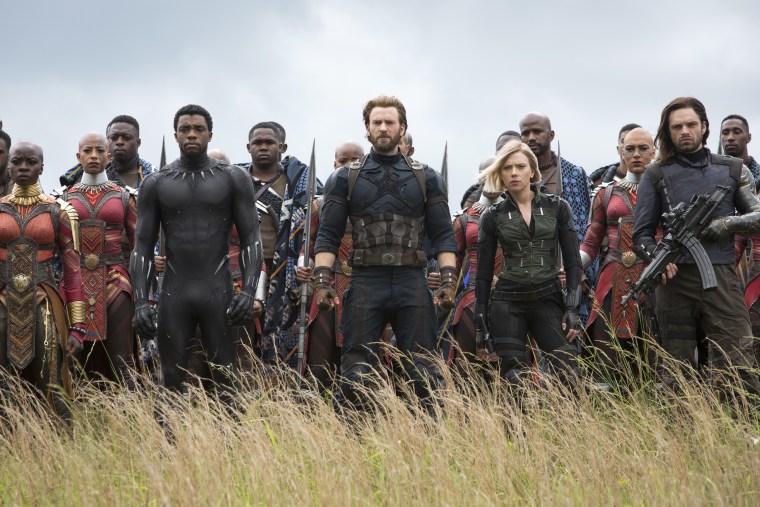I have been collecting comic books since I was 8 years old. I still spend several hundred dollars a year buying them. I dutifully attend New York Comic Con every October. I have seen almost every major Marvel and DC movie that has come out in the last 20 years and enjoyed the majority of them. I was elated when, at the end of the first “Avengers” movie, I realized that 30-plus years after I first read about him, I would finally see the mad titan Thanos on the screen.
Even so, I think there are too many superhero movies.
The Marvel movies, as well-made as they are, have become one really long film. An incredibly well-made epic, but still a monolith.
Director Martin Scorsese has been under fire for saying he doesn’t consider Marvel movies cinema but theme park attractions, as has Francis Ford Coppola for agreeing with him. I’m not a die-hard Scorsese devotee, but I admire his work and respect his opinion. And the reality is, Scorsese raises a valid point, despite the inevitable fanboy freakout and the umbrage of Hollywood superhero doyens at his disdain. In fact, Scorsese is sounding an important wake-up call, and it would be wise for all those invested in superhero movies — creators and audiences alike — to see this as constructive criticism that can help save the genre and the broader film landscape. Box-office grosses be damned.
Scorsese feels that Marvel movies do not take risks, that they are tailor-made to fit audience expectations and are “market-researched, audience-tested, vetted, modified, revetted and remodified until they’re ready for consumption.” I think they usually show more heart than that, but I see where he’s coming from. Further, as he notes, the focus on movies that get a massive wide release leaves less room for other, typically smaller movies. (Coppola, for his part, angered Disney CEO Bob Iger and many fans by calling Marvel movies “despicable,” which is harsh.)
I completely understand somebody who’s not enamored with comic books or superheroes being weary of how they’ve become ubiquitous in pop culture. They get covered in the media a lot, which overshadows more modest but still worthy films that get left out of the spotlight and, even with streaming services, can get lost in the shuffle. Not to mention the endless sequels, reboots and franchising of other properties into alternate forms that Hollywood banks on for, well, bank. It’s become fast, furious and exhausting.
I feel burnt out myself. I think the Marvel movies, as well-made as they are, have become one really long film. An incredibly well-made epic, but still a monolith in which each entry generally serves a common purpose. Good triumphs over evil, with occasional shades of gray to remind us of people’s humanity. I know that’s a tad reductionist, but they do follow a formula — one that has produced $22 billion in box-office grosses in just over a decade. Indie and arthouse films, even smaller studio films, simply cannot compete with those numbers.
That’s not to say that Marvel movies are empty cinematic calories. “Doctor Strange” is a tale of psychedelic imagination and redemption. “Black Panther” tackles prejudice within one’s own ethnic group, something we’ve rarely seen in an action film. “Captain America: Civil War” pits heroes against each other. “Avengers: Endgame” is not without its casualties, foremost that of Iron Man, which rams home the point that sacrifice must often be made in order for society to survive and progress. On the DC front, I love how “Wonder Woman” showcases a female goddess baffled by the concept of arrogant male authority and battling it full throttle.
Like me, Kareem Abdul-Jabbar appreciates both Marvel and Scorsese and recognizes how superhero franchises offer more immediate emotional gratification that more serious “high art” makes us work for. Indeed, there are many moving Marvel movie moments.
But it’s time to break free from the formula and freshen things up. The genre can do so much more — by doing less. Marvel should follow the lead of DC’s recent “Joker” movie (which is not a superhero movie, by the way, and was clearly influenced by Scorsese) and concentrate some of its efforts on smaller, more intimate stories based on a couple of characters rather than star-studded “Avengers”-style lineups. Superhero sagas don’t need countless fights or massive property destruction to make their point.
Like the turn that “Ghost Rider” took in issue #68 (May 1982), a print installment with a far superior origin presentation than the Nicolas Cage movies with the same protagonist. On a stormy night, stunt cyclist Johnny Blaze confesses his sins to a priest — how he sold his soul to Mephisto to save someone he loved, was cheated and became a demonic emissary of vengeance against wicked souls on earth. Now free from Mephisto’s hold, he still battles his inner demon for a purpose, which comes when we learn the “priest” is an impostor who killed a real man of the cloth. Blaze becomes the Ghost Rider, inflicts torment upon the man’s soul, and finds redemption and purpose on his own terms. Brilliant.
Or take “Marvel Two-in-One” issue #86 (April 1982), where in a bar the heroic Thing from the Fantastic Four and the shapeshifting villain the Sandman, presumed dead, bond over their unnatural transformations. The subtext: neither man will ever be normal again or perceived as such. There are fight scenes, but only in flashback. The sympathetic Thing pays the tab and gives the Sandman a chance to anonymously start over. It's a very human story free of casualties and destruction.
Bringing stories such as these to the big screen would show Marty. And if we could watch some less overtly battle-heavy sagas and fewer characters onscreen, and gaze deeper into the humanity of both the heroes and the villains, I might not feel so burnt out. I still welcome the production of superhero movies, but fans — and our icons — also deserve better.




